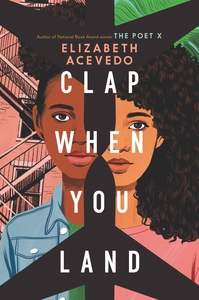Buy this from Bookshop.org to support local bookstores and the Lesbrary!
“There is another girl / on this planet / who is my kin. / My father / lied to me / every day of my life. / [ . . . ] I want to put my fingers / against my sister’s cheek. / I want to put my face / in her neck & ask / if she hurts the way I do.”
And so begins Clap When You Land, a gorgeous dual narrative novel in verse about grief, loss, and the healing power of family written by acclaimed Dominican-American poet and writer Elizabeth Acevedo (she/her).
Camino and Yahaira (Yaya) are 16-year-old young women living in the Dominican Republic and New York City, respectively. Neither knows the other exists until the tragic death of their beloved Papi upends each of their lives and reveals that they are sisters. As Camino and Yahaira grieve and desperately try to make sense of a world without Papi, they must also navigate their complex feelings about each other and figure out what it means to be sisters.
Acevedo is a masterful storyteller. Her use of dual narrative and verse made for an enjoyable and accessible reading experience. The alternating perspectives kept me engaged, and there were never too many words on a page, which allowed me to really savor what I was reading. As a Latina, I felt a swell of pride every time I saw Acevedo describe a quintessential visual from our shared experience: curious neighborhood women in batas and chancletas; a mother with rollers stacked high atop her head; a community coming together to solemnly mourn a loved one with a rosario. I also really appreciated how Acevedo highlighted the range of Afro-Latine beauty through not only her descriptions of the different characters, but also the affirmations and terms of endearment Papi used with each of his daughters.
The representation in Clap When You Land goes beyond race and color. Although all the characters have a connection to Papi, it is the strong female relationships that are the novel’s throughline. Camino refers to Tia, the curandera (healer) that raised her, as “the single love of [her] life”. Tia has showed up for Camino in ways her parents could not. Camino’s belief that “curing is in [her] blood” and her aspirations of being a doctor are borne of her deep respect and admiration for Tia. Yahaira “likes girls” and has a girlfriend named Andrea (Dre). Although Yahaira’s sexuality is a core aspect of her identity, it is free-flowing and doesn’t require exposition. Dre is Yaya’s rock. Acevedo paints a beautiful picture of how a healthy and steady love can ground you in your darkest times.
I loved this book. It was my first experience reading Acevedo’s writing, but it definitely will not be my last. If you’re looking for a quick read with lots of great Latine representation that packs an emotional punch, you should pick up this book. Acevedo has also authored Poet X, With the Fire on High, and Family Lore. You can find her on Instagram @AcevedoWrites or on AcevedoWrites.com.
Trigger warnings for descriptions of a plane crash, death, sexual assault, and colorism.
Raquel R. Rivera (she/her/ella) is a Latina lawyer and lady lover from New Jersey. She is in a lifelong love affair with books and earned countless free personal pan pizzas from the Pizza Hut BOOK IT! program as a kid to prove it.

